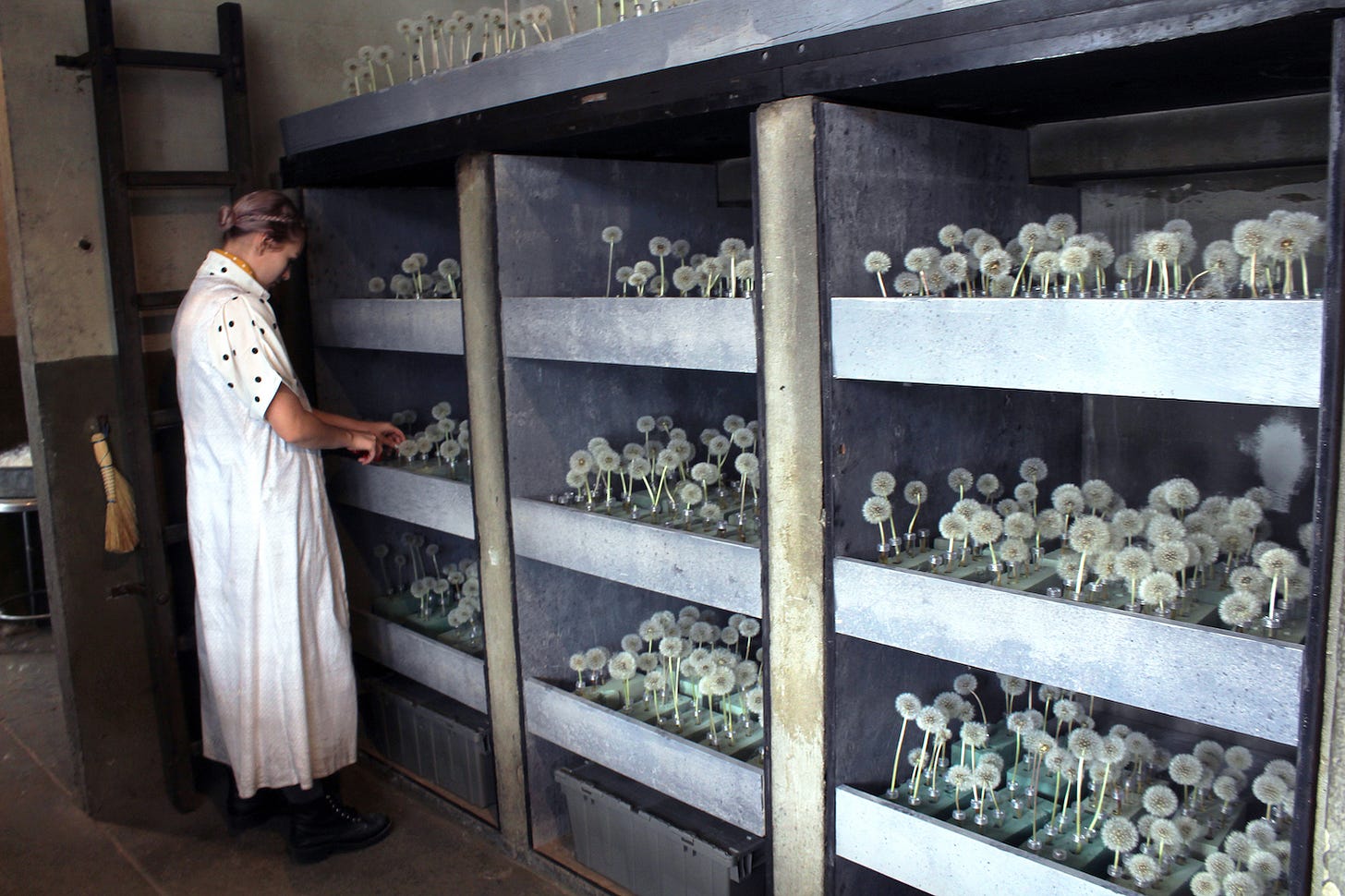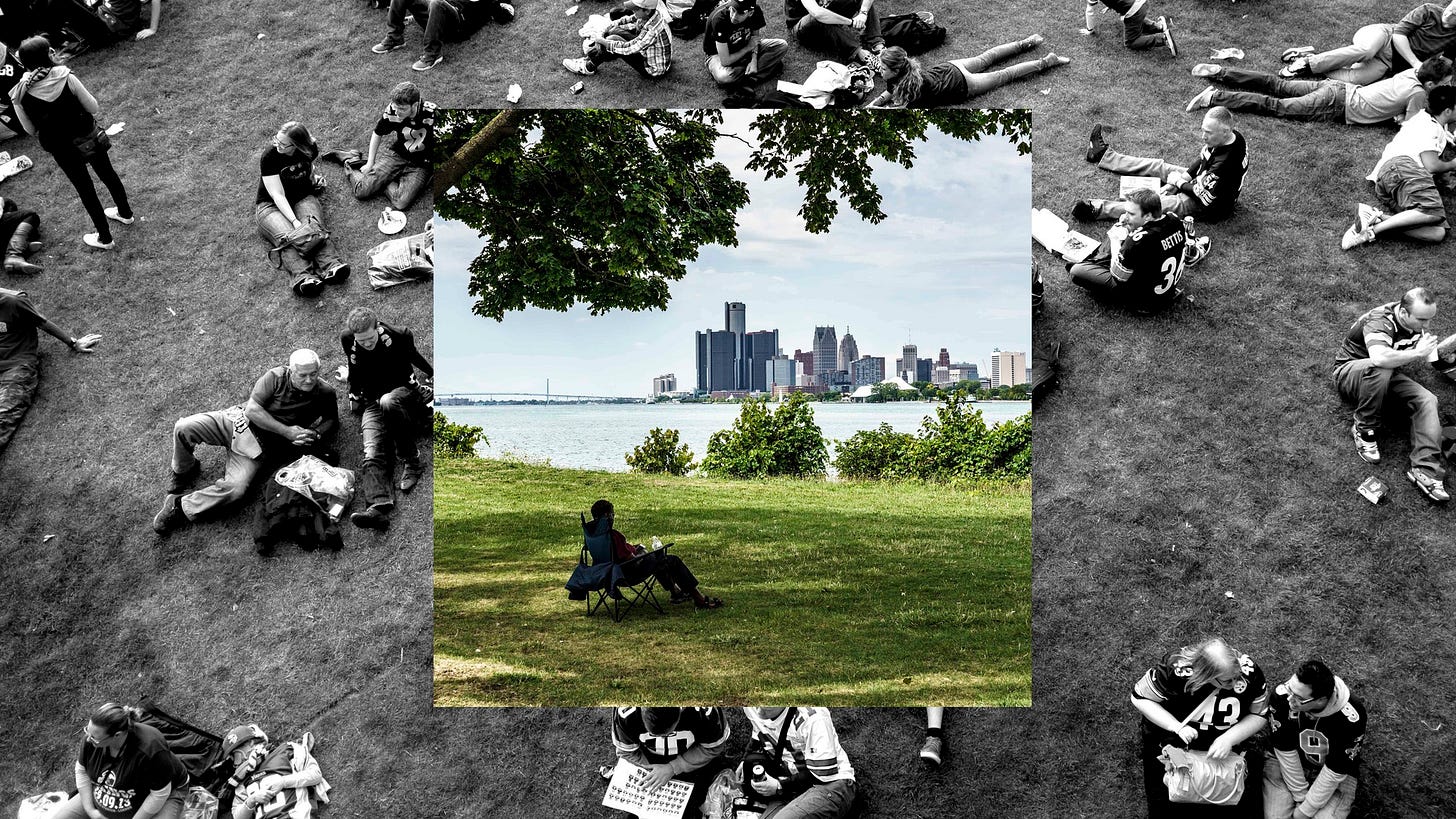🌼✨The Nexialist #0022
Dandelion | Wish-Processing Facility | 4-day Week | It’s All Coming Back | Post-Pandemic Socializers | The Ultimate Gaslighting | Bubblegum Misogyny | The Tail End | Storytelling Periodic Table
Welcome to the cuddle puddle of newsletters, The Nexialist 🦦
Last weekend I had friends over for our religious Gayturday (with RuPaul) and my friend Giacomo shared with me something with a bit of shame in his voice: “OK, did you guys know that dandelions transform from the yellow flower into the white one? Someone told me about it recently and I never knew". I was flabbergasted, even more so when we found a timelapse of it to prove it’s real. It reminded me how illiterate I am (and many of us are) at nature. So, this is for everyone reading who didn’t know this. I hope you enjoy this very simple (and cheerful) piece of knowledge.
🌬Wish-Processing Facility
Since I saw this post about The Art Department’s installation a couple of years ago, it really stayed with me. Whimsical is the perfect way to describe it.
Visitors who wanted to make their wishes in person were handed a ticket and instructed to climb a flight of rusted stairs that led to a dilapidated administrative building. Inside, a grassy, dandelion-lined corridor pointed wishers to their first station: a cramped office where a brusk employee asked the visitor to describe their wish without spilling the specific details (the Department of Small Things That Float on the Wind, which oversees the wish-processing facility, firmly believes that sharing a secret wish automatically disqualifies it from coming true). The bureaucrat asked more general questions. Could the wish be categorized as altruistic or selfish? Did it pertain to romance or your career?
Read: LA Factory that Processes Your Dandelion Wishes, Renée Reizman - HyperAllergic
🌞4-day Week
I think a four-day weekend would be a collective wish. Will Spain lead us again? Hopefully:
Companies have recently been experimenting with four-day weeks in the hope that a shorter week will ultimately improve their bottom lines. But the concept broke new ground last month, when Spain announced it will become the world’s first country to trial a four-day working week. The three-year, €50 million ($USD60 million) pilot project will launch in September.
Under the plans, an estimated 200 to 400 Spanish companies will voluntarily take part in the project by reducing their employees’ working week to 32 hours while keeping their salaries the same. The government will compensate participating businesses for any higher costs incurred by the changes, such as the need to hire additional staff or to reorganize scheduling and shift patterns. That investment will be financed through Spain’s share of the EU Coronavirus Recovery Fund.
…
Spain has long been a pioneer when it comes to labor reform. In 1593, King Philip II of Spain established an eight-hour work day by a royal edict. In 1919, strikes in Barcelona led to Spain becoming the first country in the world to introduce a maximum eight-hour working day. More recently, the tech firm Software Delsol last year became the country’s first to implement a four-day week.
Read: Spain’s Four-Day Work Week Is a Game Changer - Reasons to be Cheerful
🥲It’s All Coming Back
Warning: maybe you’ll have the soundtrack stuck in your head for a week.
I had a good laugh (and teary eyes). Maybe the funniest part to me is the absurdity of people missing the office in their story. But I guess this might be true for some people…
👯♂️Post-Pandemic Socializers
2 Competing Impulses Will Drive Post-pandemic Social Life. “Some people will want to go out as often as they can. Others won’t be able to forget how nice it is to sit at home on the couch.” I’m torn between the two, to be honest.
On the one hand, people will be freshly aware that they shouldn’t take the ability to attend social gatherings for granted. On the other, they also will have experienced, albeit involuntarily, the occasional pleasures of having fewer social commitments. Introverts and extroverts alike may feel torn between taking advantage of their regained freedom and preserving some of the quiet of pandemic life, but many people will end up in one of two distinct camps.
After more than a year of not having much to say yes to, it would be hard not to feel that sort of urgency. But nationwide, this reaction will likely be tempered by a newfound taste for a lower-key life. Per a report released by the Harris Poll in March, three-quarters of survey respondents said they learned during the pandemic that they “preferred smaller social gatherings at home or at [a] friend’s place over going out to bars or restaurants.” A similar proportion predicted that in the post-pandemic world, they would miss “the comfort of [their] home while socializing.”
🏮The Ultimate Gaslighting
This text was published at the beginning of the pandemic, in April 2020, and having worked in advertising for quite some time, it really stayed with me. Since there was no Nexialist back then, allow me to add it here.
Pretty soon, as the country begins to figure out how we “open back up” and move forward, very powerful forces will try to convince us all to get back to normal. (That never happened. What are you talking about?) Billions of dollars will be spent on advertising, messaging, and television and media content to make you feel comfortable again. It will come in the traditional forms — a billboard here, a hundred commercials there — and in new-media forms: a 2020–2021 generation of memes to remind you that what you want again is normalcy. In truth, you want the feeling of normalcy, and we all want it. We want desperately to feel good again, to get back to the routines of life, to not lie in bed at night wondering how we’re going to afford our rent and bills, to not wake to an endless scroll of human tragedy on our phones, to have a cup of perfectly brewed coffee and simply leave the house for work. The need for comfort will be real, and it will be strong. And every brand in America will come to your rescue, dear consumer, to help take away that darkness and get life back to the way it was before the crisis. I urge you to be well aware of what is coming.
Well, the treadmill you’ve been on for decades just stopped. Bam! And that feeling you have right now is the same as if you’d been thrown off your Peloton bike and onto the ground: What in the holy fuck just happened? I hope you might consider this: What happened is inexplicably incredible. It’s the greatest gift ever unwrapped. Not the deaths, not the virus, but The Great Pause. It is, in a word, profound. Please don’t recoil from the bright light beaming through the window. I know it hurts your eyes. It hurts mine, too. But the curtain is wide open. What the crisis has given us is a once-in-a-lifetime chance to see ourselves and our country in the plainest of views. At no other time, ever in our lives, have we gotten the opportunity to see what would happen if the world simply stopped. Here it is. We’re in it.
As much as we want “normal” back, the pandemic is still here and will be a reality for quite some time, with deep impacts on our society. Just a reminder.
Read: Prepare for the Ultimate Gaslighting*, by Julio Vincent Gambuto
💄Bubblegum Misogyny
Looking at pop culture is a great way to tell the values of our society and Vox uses that to makes us think. As this Great Pause put a period to an era, we are already able to look back and clearly see what was happening (and the shame of it all). I can’t wait to read the other articles of this series.
It is because yesterday’s misogyny is still right here and now — because it shaped our minds and our culture then, and because we are still living with those shapes today — that Vox is launching a new project we’re calling The Purity Chronicles.
The Purity Chronicles is a series that looks back at the sexual and gendered mores and values of the late ’90s and the 2000s, one pop culture phenomenon at a time. We’ll analyze all the weird and confused ideas about sex that today’s adults internalized with their squishy little teenage brains long before they were capable of understanding them, and find the subliminal ways in which those ideas continue to play out today.
Read: Britney Spears, Paris Hilton, and Whitney Houston: The bubblegum misogyny of the 2000s
👴🏻The Tail End
In this video, Kurzgesagt invites us to take a look at our lives from a macro-perspective, especially towards the future. I must say it was quite effective for me, almost on my 32 springs.
Life is engaging enough by itself and the future is this undefined weird thing. But thinking about it from time to time is helpful in refocusing on what you want to do and to minimize regrets you will have when you look back. And to remind you that if you don’t use your time today, you might not get a chance to use it tomorrow.
📓Storytelling Periodic Table
After sending the Figures of Speech periodic table, my friend André Pimenta sent me this interactive Storytelling Periodic Table by James Harris. It’s quite fun to read through it, as it’s divided into sections such as structures, story modifiers, plot devices, heroes, archetypes, villains (which seems to be the largest section.) Below, some funny ones I found while browsing:
Epileptic Trees: A term for wild, off-the-wall theories. Named after a leading tinfoil-hat theory explaining the mysterious shaking, rustling trees on Lost during its first season. The theory? The trees were having epileptic fits.
Right-Hand Cat: In an evil contrast to how much Heroes Love Dogs, Diabolical Masterminds are cat people. If they don't have a face, they will usually have a pet cat, usually some shade of white or black, sitting on their desk or in their lap, that they stroke as they describe their Evil Plan.
Reality Is Unrealistic: When exposed to an exaggeration or fabrication about certain real-life occurrences or facts, some people will perceive the fictional account as being more true than any factual account. Very widespread in fiction. In Real Life, it is commonly expressed as "you can't make this shit up".
🪞On Repeat
Sigrid has this power of making feel-good catchy music. This is one of those songs you like the first time you listen.
👨🏻Barcelona
It fascinates me that this was filmed and produced such a long time ago. It feels timeless, even if I found out about it a couple of months ago.
❤️If anything made your brain tingle, click like and don't hesitate to share it with the world. It helps The Nexialist to reach more curious minds. See you next week!🦦
🫀If you enjoyed this newsletter, please share it with your friends. If someone amazing sent it to you, tell them you love them, and you can subscribe at thenexialist.substack.com. If you want to know what a Nexialist is, click here. If you want to introduce yourself or give me any feedback, I would love to hear from you. Drop me an e-mail or say hi on LinkedIn or Instagram.










